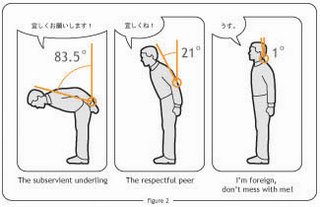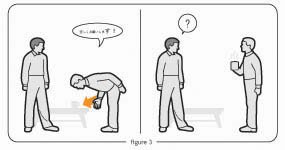Gamesmanship - part 2
Know your place
In Japan the bow is used to pay appropriate respects to whomever you are bowing to. How deep you bow, duration and regularity or refusal to actually stop bowing all show due deference to your superior. The gamesman though reverses this tactic and uses the bow to impose his perceived position on others. As a foreigner making a cultural faux pas means very little. You are not meant to understand the ins and outs of such niceties. So when you bow, bow as little as you can. Consciously the other person will see this as a failure of a non-national to understand and adhere to the rules, but subconsciously he will be put in his place (fig. 2).

Study these examples
"Mr. Gaijin-san, good morning!"
Deep bow, "Good morning, honerable colleague!"
"We have a lot of work for you to do today!"
"Mr. Gaijin-san, good morning!"
Quick nod, "Morning."
"How is sir today? I hope sir will be kind enough to consider some of our humble requests."
If at all possible the gamesman's chin must never be lower than his Adam's apple. Once you have learnt this version of the "bow", be sure to use it often so that people will think you are very polite and socially minded.
If one is forced into a show of respect to an undeserving recipient, say to someone with decisive power over your continued employment, the gamesman should combine the bow with another activity which requires the downward motion. Bow deeply but before you get up, scratch your knee, or pick up an object as if that was the reason you were down there (fig. 3). The recipient will be slightly confused as to whether you were showing him the respect he expected or not. He may feel good about himself but at the same time be unsure as to your status.
 Bowing is a weapon, not a mere social nicety. The true gamesman knows this all too well and will make extensive use of it.
Bowing is a weapon, not a mere social nicety. The true gamesman knows this all too well and will make extensive use of it.









Are you serious about the last trick??? o_O Oh boy, it looks very strange.
ReplyDeleteSure, all gamesman posts are definitely absolutely 100% serious! ;-)
ReplyDeletejordan shoes
ReplyDeleteadidas yeezy
kyrie irving
hermes bag
off white clothing
golden goose sneakers
giannis shoes
bape outlet
golden goose superstar
yeezy
off white outlet
ReplyDeletegiannis antetokounmpo shoes
hermes
supreme clothing
fear of god
golden goose
kd 15
golden goose
yeezy 350
palm angels